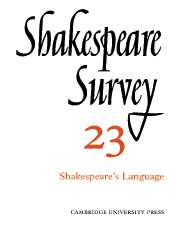Book contents
- Frontmatter
- Shakespeare and the Tune of the Time
- Some Functions of Shakespearian Word-formation
- Guide-lines for Interpreting the Uses of the Suffix ‘-ed’ in Shakespeare’s English
- Shakespeare’s Use of Colloquial Language
- Words, Action, and Artistic Economy
- ‘Antony and Cleopatra’: the Limits of Mythology
- Shakespeare’s ‘War with Time’: the Sonnets and ‘Richard II’
- Shakespeare and Christian Doctrine: Some Qualifications
- Shakespeare’s Poets
- The Text of Coleridge’s 1811–12 Shakespeare Lectures
- Shakespeare Studies in German: 1959–68
- A Neglected Jones/Webb Theatre Project: ‘Barber-Surgeons’ Hall Writ Large
- Interpretation or Experience? Shakespeare at Stratford
- 1 Critical Studies
- 2 Shakespeare’s Life, Times, and Stage
- 3 Textual Studies
- Index
- Plate section
Words, Action, and Artistic Economy
Published online by Cambridge University Press: 28 March 2007
- Frontmatter
- Shakespeare and the Tune of the Time
- Some Functions of Shakespearian Word-formation
- Guide-lines for Interpreting the Uses of the Suffix ‘-ed’ in Shakespeare’s English
- Shakespeare’s Use of Colloquial Language
- Words, Action, and Artistic Economy
- ‘Antony and Cleopatra’: the Limits of Mythology
- Shakespeare’s ‘War with Time’: the Sonnets and ‘Richard II’
- Shakespeare and Christian Doctrine: Some Qualifications
- Shakespeare’s Poets
- The Text of Coleridge’s 1811–12 Shakespeare Lectures
- Shakespeare Studies in German: 1959–68
- A Neglected Jones/Webb Theatre Project: ‘Barber-Surgeons’ Hall Writ Large
- Interpretation or Experience? Shakespeare at Stratford
- 1 Critical Studies
- 2 Shakespeare’s Life, Times, and Stage
- 3 Textual Studies
- Index
- Plate section
Summary
‘Here therefore is the first distemper of learning’, wrote Bacon of the Renaissance Latinists, ‘when men study words and not matter.’ Had he been interested in the drama of his own country, he might have said something similar about the best plays that were being written at the time when Shakespeare was composing his first extant works, somewhere around 1589. But, if he had been fair, he would have added that the copie which had such an appeal for Marlowe and Kyd was one of the things that helped to make their plays sing, where those of their predecessors had merely jingled. Still, the distemper was there; and, as many critics have noted, Shakespeare himself was not immune from it. There is something prodigal about his use of language in the early plays. Delighting in its Protean qualities, he often allows his fascination with a figure of speech to come into conflict with his dramatic purposes. Unlike his contemporaries, however, he also seems to have been aware of the danger from a very early stage, for there are times when he appears to be catching himself out, as it were. The opening of 3 Henry VI, ii, v, for example, presents the King soliloquizing while the battle of Towton goes on around him. He launches at once into an elaborate double simile, comparing the state of the battle first to the conflict of clouds with growing light at dawn, and then to that between the wind and the tide. The vivid sensuous picture that he paints extends over twelve lines; but, at the end of it, Shakespeare seems suddenly to have realized that his audience might well have forgotten what the point of the similes was, for, having begun with the line ‘This battle fares like to the morning’s war’, he now has the King add ‘So is the equal poise of this fell war’.
- Type
- Chapter
- Information
- Shakespeare Survey , pp. 49 - 58Publisher: Cambridge University PressPrint publication year: 1970



